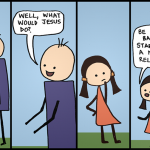WWJD or WDJD?
- Bible
- Bible study
- Christian Evidences
- Christian Living
- Christianity
- Cross
- Dr Eliezer Gonzalez
- Eternal Life
- Faith
- Gospel
- Holy Spirit
- Jesus
- New Testament
Jan 20, 2015 7584

Some years ago, I remember that the letters WWJD were popular among Christians. They stand for “What Would Jesus Do?” It was a question that challenged people to consider what Jesus would have done if he were faced with the choices and challenges that we face today. People put WWJD everywhere – on key-chains, bracelets, and on T-shirts, just to remind themselves to keep asking that question.
I don’t want to diminish this important perspective at all. However, I do want to put it into context. Because there is a much, much more important question than WWJD.
The more important question is WDJD.
Without WDJD, WWJD is totally and absolutely meaningless and useless to any follower of Christ.
What does WDJD stand for, I hear you ask? It stands for “What Did Jesus Do?”
It goes back to the question of whether Jesus is our substitute or whether Jesus is our example. Of course he is both. But he is only our example because he was our substitute first.
It goes back to the question of whether the gospel is what Christ has accomplished for our salvation, or whether the gospel is a set of ethical principles with the life of Jesus as their greatest moral example. Every time that the New Testament defines what the gospel is, it is in the past tense. Every time that the New Testament defines how we must respond to the gospel, or the blessings of the gospel, these are in the present tense. The present tense question, “What Would Jesus Do? can only be profitably answered by someone who has already found the answer to the past tense question, “What Did Jesus Do?”
The failures and sins of your past are not wiped away by WWJD. Your present reality is not transformed by the moral challenge of WWJD. You have not been given assurance of your future happiness and eternal life by WWJD. It is only WDJD that gives you all of these things.
Why? Because the things that Jesus did, you cannot perfectly do in the flesh – not even close! And not in this life! And even if you could, there is a whole lifetime of sin-baggage that you carry with you that means that whatever good you did, would count for nothing towards your righteousness.
It is only because of what Jesus did – that he sacrificed his own life as an atonement for your sin and rose again for your victory – that life can have any meaning at all. And when you have understood the answer to the question WDJD, then the question WDJD will have new meaning. The answer to WWJD will not simply lie in the ethical challenge of a perfect life, but it will be couched in the context of an eternally grateful heart – a heart that is being transformed and empowered by the Holy Spirit.
When faced with a dilemma or temptation, as yourself first “What Did Jesus Do?” for you. And then, when you are overwhelmed by his love – then and only then – you will be prepared to consider “What Would Jesus Do?” in that situation.
The answer to WDJD is the root of the gospel. The answer to WWJD is the fruit of the gospel. If you want the fruit, you have to focus on the root.
Ultimately, as wonderful as the example of the life of Christ may be, there is no power in WWJD. His life would have meant nothing if he had not died on the cross and risen again. Power for living as followers of Christ only comes from an understanding and acceptance of faith of what Jesus did.
All power and all authority for our lives come from what Jesus did at Calvary. There is no other way.
It’s called the gospel.
– Eliezer Gonzalez
